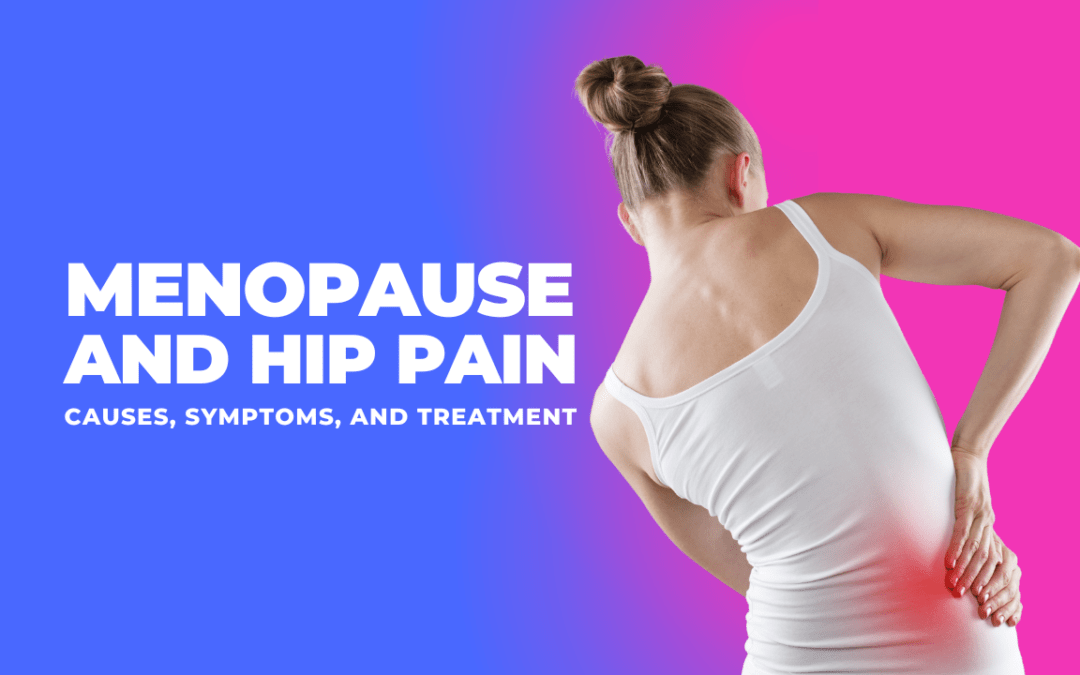Menopause brings significant hormonal changes that can affect various parts of the body, including the joints and bones. Many women experience hip pain during and after menopause, often due to estrogen decline and its impact on bone density, joint lubrication, and muscle function. Understanding the causes and treatment options can help manage discomfort and maintain mobility.
Causes of Hip Pain During Menopause
Hormonal Changes and Joint Health
- Estrogen Decline: Estrogen helps maintain joint and bone health. As levels decrease, inflammation can increase, leading to joint pain and stiffness.
- Reduced Collagen Production: Collagen supports cartilage and connective tissues. Its decline can lead to joint degeneration and discomfort.
- Inflammation: Increased inflammation can contribute to conditions like osteoarthritis, affecting the hips and other joints.
Bone Density and Osteoporosis
- Increased Risk of Osteoporosis: Estrogen plays a crucial role in maintaining bone density. Postmenopausal women are at higher risk of osteoporosis, leading to brittle bones and an increased risk of fractures.
- Stress Fractures: Thinning bones can result in microfractures, especially in weight-bearing joints like the hips.
Muscle and Ligament Weakness
- Loss of Muscle Mass: Menopause is associated with a gradual loss of muscle mass, which can affect hip stability and increase strain on the joint.
- Tendon and Ligament Stiffness: Reduced elasticity in soft tissues can contribute to discomfort and reduced range of motion.
Weight Gain and Mechanical Stress
- Metabolic Changes: Menopause often leads to weight gain, increasing pressure on the hip joints.
- Altered Posture and Gait: Hormonal changes can affect balance and posture, leading to additional strain on the hips.
Symptoms of Menopausal Hip Pain
- Stiffness: Difficulty moving the hip joint, especially after long periods of inactivity.
- Aching or Sharp Pain: Discomfort may be mild or severe, affecting one or both hips.
- Pain Radiating to Other Areas: Hip pain may extend to the lower back, thighs, or knees.
- Reduced Mobility: Difficulty walking, standing for long periods, or climbing stairs.
- Swelling or Tenderness: Some women experience mild swelling around the hip joint.
Effective Treatment Options
Hormone Replacement Therapy (HRT)
HRT can help restore estrogen levels, reducing inflammation and supporting joint health. Amazing Meds provides personalized HRT solutions to address menopause-related symptoms, including hip pain.
Medications for Pain Relief
- Nonsteroidal Anti-Inflammatory Drugs (NSAIDs): Over-the-counter pain relievers like ibuprofen can reduce inflammation and pain.
- Topical Analgesics: Creams containing menthol or capsaicin can provide localized relief.
- Prescription Medications: In cases of severe pain, doctors may recommend stronger medications or corticosteroid injections.
Lifestyle Modifications
- Regular Exercise: Low-impact activities like swimming, cycling, and yoga can improve joint flexibility and strengthen supporting muscles.
- Weight Management: Maintaining a healthy weight reduces stress on the hip joints.
- Proper Posture and Ergonomics: Using supportive footwear and ergonomic seating can help minimize hip strain.
Physical Therapy
A physical therapist can design a personalized exercise program to strengthen hip muscles, improve mobility, and reduce pain.
Dietary Support for Bone and Joint Health
- Calcium and Vitamin D: Essential for maintaining bone strength and preventing osteoporosis.
- Anti-Inflammatory Foods: Omega-3 fatty acids (found in fish, flaxseeds, and walnuts) can help reduce joint inflammation.
- Collagen Supplements: May support cartilage and connective tissue health.
Peptide Therapy for Joint Health
Peptide therapy is an emerging treatment that supports tissue repair and regeneration. Certain peptides may enhance collagen production, reduce inflammation, and promote joint healing. Amazing Meds offers cutting-edge peptide therapy options tailored to individual needs.
Preventing Hip Pain During and After Menopause
- Stay Active: Engage in regular physical activity to maintain joint flexibility and muscle strength.
- Strength Training: Exercises targeting the hips, thighs, and core can enhance stability and reduce strain on the joints.
- Hydration and Nutrition: Drinking enough water and consuming a balanced diet supports overall joint health.
- Routine Check-Ups: Regular bone density screenings and check-ups with a healthcare provider can help identify and address issues early.
How Amazing Meds Can Help
At Amazing Meds, we specialize in personalized treatments for menopause-related symptoms, including hip pain. Our expert team offers:
- Hormone Replacement Therapy (HRT): Customized plans to restore hormonal balance and support joint health.
- Peptide Therapy: Advanced solutions for joint repair and pain management.
- Comprehensive Consultations: Tailored treatment plans to meet your specific needs.
If menopause-related hip pain is affecting your quality of life, contact Amazing Meds today to explore effective treatment options and regain comfort and mobility.
Disclaimer: This article is for informational purposes only and does not replace professional medical advice.
